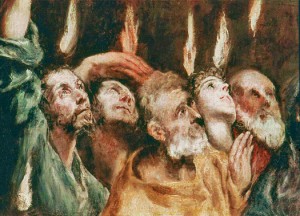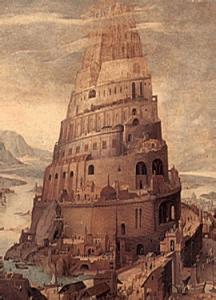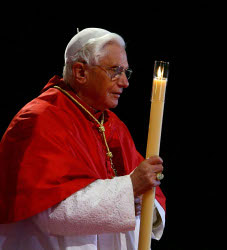May 27, 2012 - Solemnity of Pentecost
The readings for this Sunday are: Acts 2:1-11; 1 Corinthians 12:3b-7, 12-13 or Galatians 5:16-25; John 20:19-23 or John 15:26-27; 16:12-15
Christian theology of the Holy Spirit is rooted in Judaism. The term Spirit translates the Hebrew word (ruah) and even in the pronunciation of it we detect God’s wind and breath. The wind of God, the breath of God, the presence of God are all ways of referring to God’s presence.
The expression “Holy Spirit” was used only seven times in the Old Testament, whereas the terms “Spirit of God” or “Spirit of the Lord” occurs 67 times in the Hebrew Scriptures. In the very first line of the book of Genesis 1:1, God’s Spirit was gently hovering over the primordial waters waiting for the opportune moment of drawing order from that chaos.
Jesus, himself, uses the sensory image of the wind in the mysterious, nocturnal conversation with Nicodemus when he talks about the Spirit as the wind that blows where it wills (cf. John 3). This, then, is the Spirit’s first function in the Scriptures: to be the mysterious presence of God in history, not reducible to human or earthly logic.
The second function of the Spirit in the Old Testament is that of putting things in order. The Genesis creation account (Chapter 1) reveals a descending Spirit upon this formless world and its descent produces the miracle of creation, the transformation of chaos into cosmos, of disorder into order, of anonymity into community.
 The third function of the Spirit in the Old Testament is life-giver. In Genesis 2:7, we read: “The Lord God formed man from the dust of the ground, and breathed into his nostrils the breath of life; and the man became a living being.” As a result of this divine breath, the human creature is transformed into a living being, no longer to be simply a creature but a partner made in the image and likeness of God, with whom and to whom God speaks and confides responsibility for the world.
The third function of the Spirit in the Old Testament is life-giver. In Genesis 2:7, we read: “The Lord God formed man from the dust of the ground, and breathed into his nostrils the breath of life; and the man became a living being.” As a result of this divine breath, the human creature is transformed into a living being, no longer to be simply a creature but a partner made in the image and likeness of God, with whom and to whom God speaks and confides responsibility for the world.
The fourth function of the Holy Spirit is guide. We read in Isaiah 11: “The spirit of the Lord shall rest upon him, the spirit of wisdom and understanding, the spirit of counsel and might, the spirit of knowledge and fear of the Lord.” The fear of the Lord is not something that terrorizes people but could be understood as our ability to say “wow,” “awesome” before God’s handiwork and God’s creation.
The fifth function of the Spirit is healer, articulated so powerfully in the prophecy of Ezekiel 36:26-27 – “A new heart I will give you, and a new spirit I will put within you; and make you follow my statutes and be careful to observe my ordinances.” The Spirit enters, recreates, restores to health and vanquishes sin.
The sixth function of the Holy Spirit is the universal principle. We read in Joel 2:28-29: “I will pour out my spirit on all flesh; your sons and your daughters shall prophecy … Even on the male and female slaves, in those days, I will pour out my spirit.” The day will come when all humanity will be truly possessed by the spirit and that day will coincide with the eagerly awaited Messianic age of which the prophets speak. It was this principle that captivated Jesus’ activity and ministry in a remarkable way.
The seventh function of the Holy Spirit takes place on the feast of Pentecostwhen the disciples were all filled with the Holy Spirit and began to speak in other tongues as the Spirit gave them utterance. The coming of the Holy Spirit signals the start of a world-wide mission for Christians beyond their geographic boundaries of Israel, first from Israel to Rome, and then from Rome then to the ends of the earth. It is a mission that overcomes human obstacles and has the Spirit as its driving force.
The Catholic Experience
The Holy Spirit makes the Christian experience truly Catholic and universal, open to all human experience. To be Catholic is to be universal and open to the world. Not only to Canada, North America, Europe or Asia, or a certain familiar part of the world or segment of society, but it must be open to all, to every single person. The mind of Christ is not intended to be a selective mentality for a few but the perspective from which the whole world will be renewed and redeemed. An insight like this, the universal scope of salvation did not however come easily and without much pain and confusion.

In fact, the whole of the New Testament can be understood precisely as the emergence of the Catholic, the universal, in Christian life. Christianity, had it not moved from where it was particular and small would have just been a small modification of the Jewish experience, a subset of Jewish piety that was still focused in and around Jerusalem and the restoration of a literal kingdom of Israel. The first two generations of Christians discovered that Christianity could not be just that. Because they had received the Holy Spirit, which is the universal principle, the Holy Spirit opened peoples’ eyes to the universal import of the Christian truth and through the encounter with non-Jews who received the Holy Spirit.
The artists of the Middle Ages often contrasted the Tower of Babel with the “Tower” of the Upper Room. Babel symbolizes the divisions of people caused by sin. Pentecost stands for a hope that such separations are not a tragic necessity. The babbling mob of Babel compares poorly with the heartfelt unity of the Pentecost crowd. Babel was a mob. Pentecost was a community. A people without God lost the ability to communicate. A people suffused with the Spirit spoke heart to heart.
At Pentecost the full meaning of Jesus’ life and message is poured into our hearts by the Spirit alive in the community. The New Testament seems to say that – for a fleeting moment – the nations of the earth paused from their customary strife and experienced a community caused by God. The brief and shining hour of Pentecost remains to charm and encourage us to this day.
World Youth Day
One of the finest teachings on the Holy Spirit in recent times took place in July, 2008 during the great vigil at World Youth Day in Sydney, Australia. The Saturday evening prayer vigil at the Randwick Racecourse on July 19 began in darkness, gradually illuminated by torches borne by dancers on the podium, representing the opening to the Holy Spirit.
“Tonight we focus our attention on how to become witnesses,” Benedict XVI told the young people in his address. “You are already well aware that our Christian witness is offered to a world which in many ways is fragile. The unity of God’s creation is weakened by wounds that run particularly deep when social relations break apart, or when the human spirit is all but crushed through the exploitation and abuse of persons. Indeed, society today is being fragmented by a way of thinking that is inherently shortsighted, because it disregards the full horizon of truth, the truth about God and about us. By its nature, relativism fails to see the whole picture. It ignores the very principles which enable us to live and flourish in unity, order and harmony”.
 Yet, the Pope went on, “such attempts to construct unity in fact undermine it. To separate the Holy Spirit from Christ present in the Church’s institutional structure would compromise the unity of the Christian community, which is precisely the Spirit’s gift! (…) Unfortunately the temptation to ‘go it alone’ persists. Some today portray their local community as somehow separate from the so-called institutional Church, by speaking of the former as flexible and open to the Spirit and the latter as rigid and devoid of the Spirit.”
Yet, the Pope went on, “such attempts to construct unity in fact undermine it. To separate the Holy Spirit from Christ present in the Church’s institutional structure would compromise the unity of the Christian community, which is precisely the Spirit’s gift! (…) Unfortunately the temptation to ‘go it alone’ persists. Some today portray their local community as somehow separate from the so-called institutional Church, by speaking of the former as flexible and open to the Spirit and the latter as rigid and devoid of the Spirit.”
“Let us invoke the Holy Spirit: He is the artisan of God’s works,” the Pope concluded. “Let His gifts shape you! Just as the Church travels the same journey with all humanity, so too you are called to exercise the Spirit’s gifts amidst the ups and downs of your daily life. Let your faith mature through your studies, work, sport, music and art. Let it be sustained by prayer and nurtured by the Sacraments. (…) In the end, life is not about accumulation. It is much more than success. To be truly alive is to be transformed from within, open to the energy of God’s love. In accepting the power of the Holy Spirit you too can transform your families, communities and nations. Set free the gifts! Let wisdom, courage, awe and reverence be the marks of greatness!”
Come Holy Spirit!
We read in the Gospels “But the Advocate, the Holy Spirit, whom the Father will send in my name, will teach you everything, and remind you of all that I have said to you.” (John 14:26). This act of reminding and recalling is stated very clearly in the Catechism of The Catholic Church, (No. 1099) “The Holy Spirit is the Church’s living memory.” On this great feast and birth of the Church, let us pray for the gift of memory, and for the courage to move from the empowering mystery of the Upper Room to the reality of daily life.
Come Holy Spirit, fill the hearts of your faithful
And kindle in us the fire of your Love!
Lord, send us your Spirit,
And renew the face of the earth…
The face of our Church, the face of our communities,
Our own faces, our own hearts. Amen.
Fr. Thomas Rosica, CSB
CEO, Salt and Light Catholic Media Foundation
CEO, Salt and Light Catholic Media Foundation
